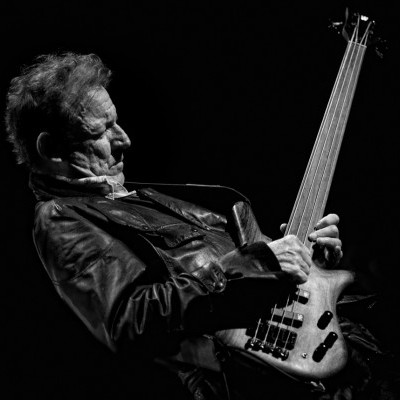
Jack Bruce (1943-2014) continued playing jazz and blues while performing in Cream during the 1960s.
(Photo: Marek Hoffmann)When did you first meet Ginger Baker?
I had this band at Cambridge, St. Johns College, and I heard this amazing band playing in a cellar on campus. That was [saxophonist] Dick Heckstall-Smith with Ginger Baker on the drums. I’d never heard the drums played like that live. It compared to Elvin Jones. Ginger was the loudest drummer I’d ever heard, but also exciting in how he looked and the whole presence. I had to play with him, so I asked if I could sit in. Dick was the bandleader. He must have thought I was a student and said, “No, we don’t allow that without prior arrangement.” I kept asking him and eventually I brought my bass, and carried it through the crowd to the stage. He tried to cut me. He said we were going to do a ballad, “Lover Man,” and said, “You play the melody.” He was amazed when I did it. Then we did a blues. They were surprised I could do that. Then I left. Dick spent about a month trying to find me.
Dick got you into Alexis Korner’s Blues Incorporated, your introduction to the blues, right?
Blues Incorporated was like an early fusion band. We were playing blues but applying our own jazz sensibilities, in the same way [Charles] Mingus did with a lot of his records. When I joined, the band had Charlie Watts on drums, Alexis [on guitar and vocals], Cyril Davies on blues harmonica and Johnny Parker, the pianist for the Humphrey Lyttleton Band.
Did most English jazz musicians frown on Blues Incorporated?
Yeah, all the early British rock records, as with all the early American rock ’n’ roll records, had jazz players slumming, playing sessions. But if you were taking it seriously, you were looked down on. The generation before us—Ronnie Scott, Bobby Wellins—as great as they were, never got what we were about. We thought we had our own identity, because we had time to absorb a lot of those influences, including the new movement of people like Ornette Coleman and Eric Dolphy.
You mentioned Mingus earlier. Were you listening to him a lot?
All the time. I first became aware of Mingus when I worked on an American air force base in Italy when I was about 18. Once a week, there was a jazz evening when people would play records. They had an amazing record library, and me being a bass player, one of the guys said, “You got to hear this.” There it was, Charles Mingus. That changed the direction of my thinking, because he became the person that I wanted to emulate. Before that it was a player like Scott LaFaro, but Mingus was a composer, which was what I wanted to be.
What about Mingus influenced you?
His approach. Maybe a technical and fast approach didn’t interest him or maybe he wasn’t technically equipped to do that. I think he played the bass in the same way that I see the bass in my hands: as an adjunct of myself, not as an instrument. When I was young I was [impressed] by technique, but now the chops are just part of what I do. When Mingus was younger—Jazz At Massey Hall—and listen to Mingus Ah Um later on, the bass is possibly under-recorded, compared to other jazz records of the time. I’m sure he was involved in the mix. He wasn’t trying to put the bass out front.
Cream formed after you left Manfred Mann, Clapton split Mayall’s Bluebreakers and Baker quit Graham Bond. Do you think you revolutionized rock?
Ginger and I were playing a free-jazz improvisational approach within a rock band. When the band started, we all had different ideas about what the band was. Eric thought it was a backing band for his blues guitar, and Ginger—it was basically his band—I don’t know what he thought it was. I felt it was a vehicle for my songs.
There seemed to be jazz motion and spark to several songs you wrote for Cream, and blues underscored everything.
It must all be there, because those were the things that I loved. A song like “I Feel Free” exists in the air of the time. If somebody invents the television, there are another six people who are about to invent it. That’s the same thing with songs. The approach to the pop song that I was trying to do, with Pete Brown’s lyrics, was to come up with some surprising approaches, not the traditional song form.